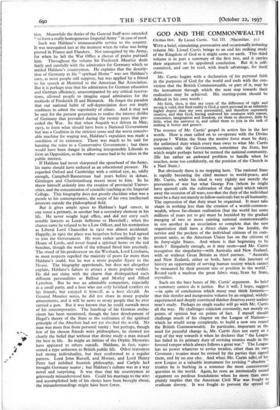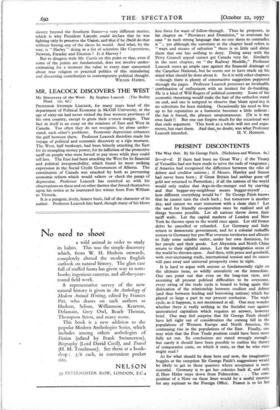GOD AND THE COMMONWEALTH
Civitas Del. By Lionel Curtis.- Vol. III. (Macmillan. 5s.) Wins a brief, stimulating, provocative and occasionally irritating volume Mr. Lionel Curtis brings to an end his striking study of the Kingdom of God as it might come on earth. This third
volume is in part a summary of the first two, and it carries their argument to its appointed conclusion. But if; is self- contained, and can be read, with Much` adVintige, for itself alone.
Mr. Curtis begins with a declaration of his personal faith
in the. purposes of God for the world an- cl. ends with the con- viction that the British Commonwealth, or part of it, may be the instrument through which the next step towards their realisation may be achieved. His starting-point should be
defined in hiS own words
My faith, then, is that my sense of the difference of right and wrong is valid, that final reality is' God, a spirit personal in an infinitely higher degree than my own personality, and therefore supremely creative, and that God, having endowed his matures with reason, conscience, imagination and freedom, set them to discover, little by little, what the universe is, and called them to join in the task of making it better and greater.
The essence of Mr. Curtis' gospel in action lies in the last words. How is man called on to co-operate with the Divine purpose ? Within the State the motive force must be duty, the unlimited duty which every man owes to what Mr. Curtis sometimes calls the Government, sometimes the State, but which might perhaps better be termed the national community. (He has rather an awkward problem to handle when he touches, none too confidently, on the position of the Church in a Nazi State.) But obviously there is no stopping here. The national State is. rapidly becoming the chief menace to world-peace, and Mr. Curtis, while his _ ideal is very rightly not merely the prevention of war but what George Fox (whom he might have quoted) calls the cultivation of that spirit which taketh away the occasion of all wars, sees that the duty of the individual must be a duty not merely to fellow-nationals but to all humanity.
The expression of that duty must be organised. It must take shape in nothing less than the creation of a world-common- wealth, whose far-distant realisation (but the world has some millions of years yet to go) must be heralded by the gradual merging of two or more existing national commonwealths in one another in an association so complete that the new organisation shall have a direct claim on the loyalty, the service and the pockets of the individual citizens of its com- ponent units, as the American Union has on the citizens of its forty-eight States. And where is that beginning to be made ? Singularly enough, as it may seem—and Mr. Curtis recognises the singularity—with Australia and New Zealand, with or without Great Britain as third partner. " Australia and New Zealand, either or both, have at this juncture of history an opportunity of serving human society which cannot be measured by their present size or position in the world." Round such a nucleus the great fabric may, State by State, crystallise.
Such are the bare bones of Mr. Curtis' argument. So brief a summary cannot do it justice. But it will, I hope, suggest —in spite of conclusions which many may think fantastic— that this slender and inexpensive volume by an original, widely- experienced and deeply convinced thinker deserves every serious man's study. Perhaps no single reader will go with Mr. Curtis all the way. He challenges criticism constantly, not merely on
points . of opinion but on points of fact. I myself should challenge much of his chapter on the League of Nations— which he would scrap completely, to build a new one round the British Commonwealth. In particular, important as the
need for peaceful change is, Mr. Curtis does not carry us a
step of the way towards it when he declares that " the League has failed in its primary duty 'of revising treaties made in the fevered temper which always follows a great war." The League has no power whatever to revise treaties, other than its own Covenant ; treaties must be revised by the parties that signed them, and by no one else. And when. Mr. Curtis talks of his• new League as a valuable instrument for revising " obsolete " treaties he is burking in a sentence the most controversial question in the world. Again, he rests an intrinsically sound
argument on perilous foundations when he more • than once plainly implies that the American Civil -War was fought to eradicate slavery. It was fought to prevent the spread of
slavery beyond the Southern States—a very different matter, which is why President Lincoln could declare that he was fighting only fo preserve the Uaion, and that if he could do that without freeing any of the slaves he would. And what, by the way, is " Harley " doing in a list of scientists like Copernicus, Newton, Faraday and Einstein ? Is it Harvey ?
. But to disagree with Mr. Curtis on this point or that, even if some of the points are fundamental, does not involve under- estimating for a moment the value to every man concerned, about true religion or practical politics of this stimulating and discerning contribution to contemporary political thought.
WILSON HARRIS.































































 Previous page
Previous page